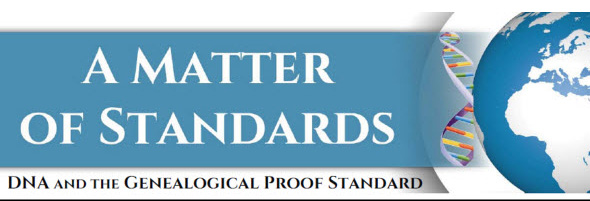DNA and the GPS
The gold standard for genealogical proofs is the Genealogical Proof Standard — the GPS, for short.

Synthesized by the Board for Certification of Genealogists between 1997 and 2000 from decades of work by the best minds in our field, the GPS clarified, organized, and compiled the field’s best practices to give us all a standard to whch our work can aspire.
Its five elements — reasonably exhaustive research, source citation, analysis and correlation of evidence, resolution of conflicts in evidence items, and a soundly reasoned written conclusion — must all be present in order for a genealogical conclusion to meet the GPS.
When first published by BCG, of course, DNA was barely in its infancy. Even when the Board published the work Genealogy Standards in early 2014, more fully discussing what it means to meet the GS in our work, the full scope of DNA’s impact on our field hadn’t yet been felt.
So, now, BCG has made it clear that it intends to more fully incorporate genetic evidence into Genealogy Standards. A committee tasked with reviewing the issue has proposed new and amended standards, and the Board is inviting public comment on the proposals.
In other words, all of us who are working to bring DNA into our research as much as we can get a chance to weigh in of these proposed standards. This means all of us, whether we’re starting out or well along the journey. Everyone in the field can speak out.
The critical questions are what among the proposals makes sense? What doesn’t? What’s clear? What’s confusing? What needs more emphasis or less?
In short, if we were judging our own work by these standards, would we be able to reach a considered judgment as to whether what we’d done was a good job or perhaps needed more work?
A copy of the proposed DNA standards in PDF format can be downloaded here.
Public comment can be submitted using the form here.
The deadline for public comment is 23 July 2018.
This is a critical step forward for DNA as part of genealogy — getting everyone as much as possible in the same mindset on what it means to have reached a genealogical conclusion based in part on DNA evidence.
Take a look, think it through, and weigh in.



I hope this makes sense and I am not complaining, just wondering about the value of a DNA test’s conclusion. My story: I recently hired a DNA expert to review my DNA findings on a relationship and confirm or refute them. She used the detailed information I provided and also created other charts and used other tools and said she agreed with my hypothesis that a particular baby belonging to two people I am strongly connected to DNA-wise was given to another couple after the mother died. That baby was my grandmother. Her name was changed and she was raised by this other couple (who I thought for years were my great grandparents) whom I have no genetic relationship to. Both the natural parents and “adopted” (actually a give away) lived in the same county and both mothers were the same age and lived in the same small town as 15-year olds. So, in addition to DNA evidence, there is also a physical connection. All this background to make this comment: When the proof is irrefutable that a relationship exists to someone in the past, it seems the only value is the knowledge of knowing. I could never use that information to obtain a Sons of the American Revolution membership or other such documents. Is my thinking correct, or is there some other genealogical value I’m not seeing?
Actually some lineage societies, including SAR, do allow the use of DNA evidence to support the application. And don’t underestimate the value of knowing .
The request for comment PDF does not include the names of those involved with drafting the proposed standards. Is that list available?
As always, you are on top of seemingly everything. Thank you for sharing this proposed standard and request for feedback. How will BCG be disseminating this to a wider audience? How will the comments be shared with commenters and the community at large?
I can’t speak to the commenting process (I’m just not familiar with how it will work) but in terms of dissemination, this has been distributed widely to the genealogical community through BCG press releases, on its website and its Facebook page, and has already been written about by folks like Blaine Bettinger.